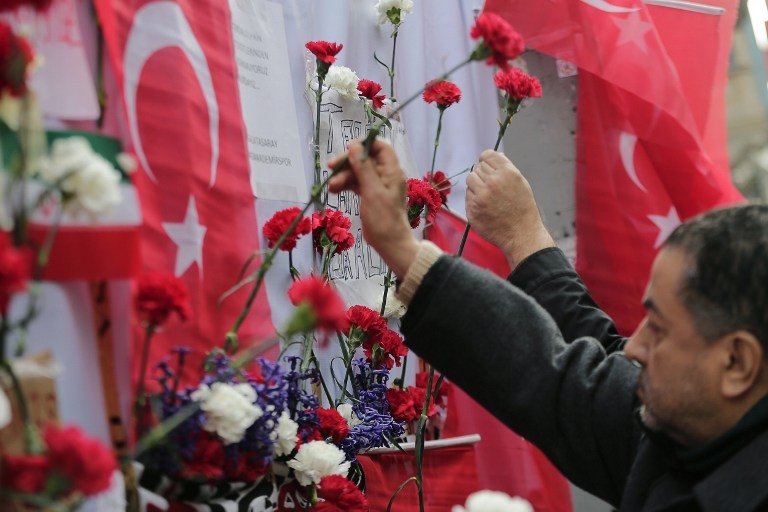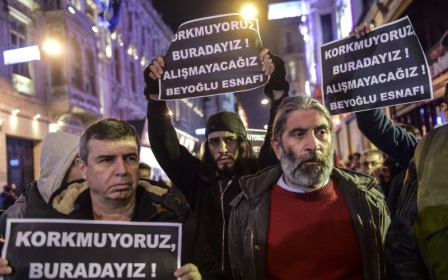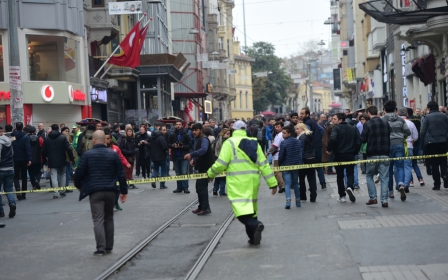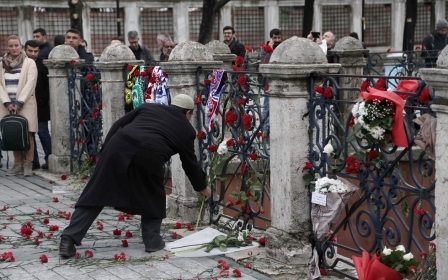Arabic press roundup: Erdogan's throne 'wobbled' by Istanbul bombing

Since the beginning of the year, Turkey has been rocked by four major bombings - two in Ankara and two in Istanbul - that have left scores of people dead and wounded.
While Saturday’s latest attack in Istanbul, Turkey's largest and most cosmopolitan city and a major draw for international tourists, was blamed by the government on the Islamic State (IS) group, critical commentators in the Arabic media said that Turkish President Recep Tayyip Erdogan was paying the price for his country’s meddling in Syria’s war.
“The Turkish bill is growing day after day because of its intervention in the Syrian crisis… The Turkish people are now the biggest casualties after the Syrian people,” columnist Tariq al-Aschar wrote in Oman’s Al Watan newspaper.
“The conflict has already impacted on tourism and the economy in the country, with the Russian boycott also hitting Turkey hard.”
In an opinion-analysis piece in the London-based Al Hayat newspaper, journalist Yousef al-Shareef said that the Istanbul bombing, which killed five people, had delivered a “knockout blow to tourism” in Turkey.
“The American and German embassies in the country warned their nationals from visiting the popular tourist destination in Turkey due to some intelligence they had. The German consulate in Istanbul closed its doors,” he said.
Al Jazeera’s Arabic news show “Behind the News” hosted a number of experts and political analysts offering a range of explanations for the incidents.
Samir Salha, a professor of international law, said: “There is more than one message from these attacks. But what’s clear here is that these attacks are targeting Turkey’s growing influence in the region as well as its national achievements.
“I think the PKK and ISIS [IS] are beneficiaries of those attacks in addition to foreign intelligence agencies that support some local groups.”
Egypt’s Coptstoday.com news outlet published an op-ed suggesting that the political establishment in Turkey was trembling due to the continuous attacks.
“The throne of Erdogan is being wobbled,” said the website. The op-ed attacked the Turkish president and described him as a failed person who often pushed blame for his failures onto his rivals.
“Erdogan is still reaping what his hands sowed in the region such as supporting terrorists in Syria,” it said.
Syria’s state-run Tishreen newspaper also seized the opportunity to launch an attack on the Turkish leadership.
Turkey, it said, was “suffering from instability and a lack of security due to its military campaigns in the southern Turkish governorates, the crackdown on media and political parties, and because of its sponsorship of terrorism in the region particularly in Syria.”
In Lebanon, Al Mustaqbal newspaper published an article tracing the attacks that had targeted Turkey over the past 25 years, pointing out that most of them had been the work of the banned Kurdistan Workers’ Party (PKK), which has been fighting the Turkish state for greater Kurdish autonomy since the 1980s.
But Kuwaiti journalist Abdulaziz Al Fadli, writing in al-Rai newspaper, said that Turkey was paying the price for taking a principled position on human rights.
"Anyone group or individual standing by justice and rights realise that they will pay the price for their positions... However, Turkey for certainly will not change its positions. The Turkish government and Erdogan are strong... Arab and Muslim countries must stand united and support Turkey and principled countries, he wrote.
The Turk-Arab news website reported the reactions of some Arab journalists such as Al Jazeera's renowned talk show presenter, Faisal Al Qsaim, who tweeted, "The political, economic and technological rise of Turkey is not good news for the world's 'hyenas'... Therefore, they want to make Turkey another Syria."
The Qatari newspaper Al Sharq also published two articles offering condolences and support to the Turkish government and people and supporting the Turkish government in its fight against terrorism.
Others speculated about other possible explanations for the attack in Istanbul, with Moustafa al-Sawaf suggesting that Israel could have been responsible in a blog post for the pro-Hamas Felesteen newspaper.
“Turkey has to look for the real perpetrator. The attacks are often branded as being carried out by separatist Kurds or ISIS [IS] but the reality could be that Israel is behind this attack. Israel has a long history of carrying such acts in Iraq and Egypt to achieve its political gains,” he wrote.
But reporter Hisham al-Fakharani of the Egyptian Youm7 newspaper said the fact that Israeli military planes had been able to land in Istanbul to collect the bodies of three Israeli victims of Saturday's bombing demonstrated the strength and depth of the relationship between Israel and Turkey amid talk of a diplomatic rapprochement between the countries, which fell out over Israel’s invasion of Gaza in 2008.
“The bombing of Istanbul has undoubtedly revealed the real face of Turkish-Israeli relations,” he wrote.
Middle East Eye propose une couverture et une analyse indépendantes et incomparables du Moyen-Orient, de l’Afrique du Nord et d’autres régions du monde. Pour en savoir plus sur la reprise de ce contenu et les frais qui s’appliquent, veuillez remplir ce formulaire [en anglais]. Pour en savoir plus sur MEE, cliquez ici [en anglais].




